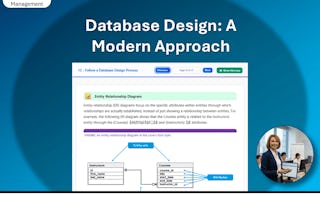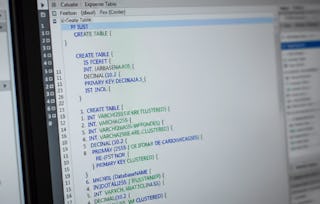Database Management Essentials provides the foundation you need for a career in database development, data warehousing, or business intelligence, as well as for the entire Data Warehousing for Business Intelligence specialization. In this course, you will create relational databases, write SQL statements to extract information to satisfy business reporting requests, create entity relationship diagrams (ERDs) to design databases, and analyze table designs for excessive redundancy. As you develop these skills, you will use either Oracle, MySQL, or PostgreSQL to execute SQL statements and a database diagramming tool such as the ER Assistant or Visual Paradigm to create ERDs. We’ve designed this course to ensure a common foundation for specialization learners. Everyone taking the course can jump right in with writing SQL statements in Oracle, MySQL, or PostgreSQL.

Database Management Essentials

Database Management Essentials
This course is part of Data Warehousing for Business Intelligence Specialization

Instructor: Michael Mannino
220,215 already enrolled
Included with
3,409 reviews
Skills you'll gain
Details to know

Add to your LinkedIn profile
25 assignments
See how employees at top companies are mastering in-demand skills

Build your subject-matter expertise
- Learn new concepts from industry experts
- Gain a foundational understanding of a subject or tool
- Develop job-relevant skills with hands-on projects
- Earn a shareable career certificate

There are 12 modules in this course
Module 1 provides the context for Database Management Essentials. When you’re done, you’ll understand the objectives for the course and know what topics and assignments to expect. Keeping these course objectives in mind will help you succeed throughout the course! You should read about the database software requirements in the second lesson of module 1. I recommend that you try to install the DBMS software this week before assignments begin in module 3.
What's included
4 videos5 readings
You will launch into an exploration of databases and database technology and their impact on organizations in Module 2. You will investigate database characteristics, database technology features, including non-procedural access, two key processing environments, and an evolution of the database software industry. This short informational module ensures a common background and context, important for success in later modules that emphasize details and hands-on skills.
What's included
7 videos8 readings2 assignments
Now that you have the context for database features and environments, you’ll start building! In this module, you’ll learn relational data model terminology, integrity rules, and the CREATE TABLE statement. You’ll apply what you’ve learned in practice and graded problems using a database management system (DBMS), either the Oracle Cloud database server with the SQL Developer client or the PostgreSQL database server with the pgAdmin client. You will use the SQL CREATE TABLE statement and populate your tables using given SQL INSERT statements. The concept quiz provides an assessment of your understanding of the video lessons and associated notes. You should complete the concept quiz before starting practice problems and the graded assignment to ensure your conceptual understanding of the material.
What's included
5 videos12 readings3 assignments
This module is all about acquiring query formulation skills. Now that you know the relational data model and have basic skills with the CREATE TABLE statement, we can cover basic syntax of the SQL SELECT statement and the join operator for combining tables. SELECT statement examples are presented for single table conditions, join operations, and grouping operations. You’ll practice writing simple SELECT statements using the tables that you created in the assignment for module 3. The concept quiz provides an assessment of your understanding of the video lessons and associated notes. You should complete the concept quiz before starting practice problems and the graded assignment to ensure your conceptual understanding of the material.
What's included
5 videos12 readings3 assignments
Now that you can identify and use the SELECT statement and the join operator, you’ll extend your problem solving skills in this module so you can gain confidence on more complex queries. You will work on retrieval problems with multiple tables and grouping. In addition, you’ll learn to use the UNION operator in the SQL SELECT statement and write SQL modification statements. The concept quiz provides an assessment of your understanding of the video lessons and associated notes. You should complete the concept quiz before starting practice problems and the graded assignment to ensure your conceptual understanding of the material.
What's included
6 videos13 readings3 assignments
Module 6 represents another shift in your learning. In previous modules, you’ve created and populated tables and developed query formulation skills using the SQL SELECT statement. Now you’ll start to develop skills that allow you to create a database design to support business requirements. You’ll learn basic notation used in entity relationship diagrams (ERDs), a graphical notation for data modeling. You will create simple ERDs using basic diagram symbols and relationship variations to start developing your data modeling skills. The concept quiz provides an assessment of your understanding of the video lessons and associated notes. You should complete the concept quiz before starting practice problems and the graded assignment to ensure your conceptual understanding of the material.
What's included
4 videos8 readings2 assignments
Module 7 builds on your knowledge of database development using basic ERD symbols and relationship variations. You will be practicing precise usage of ERD notation and basic problem solving skills. You will learn about diagram rules and work problems to help you gain confidence using and creating ERDs. The concept quiz provides an assessment of your understanding of the video lessons and associated notes. You should complete the concept quiz before starting practice problems and the graded assignment to ensure your conceptual understanding of the material.
What's included
6 videos10 readings2 assignments
In Module 8, you’ll use your ERD notation skills and your ability to avoid diagram errors to develop ERDs that satisfy specific business data requirements. You will learn and practice powerful problem-solving skills as you analyze narrative statements and transformations to generate alternative ERDs. The concept quiz provides an assessment of your understanding of the video lessons and associated notes. You should complete the concept quiz before starting practice problems and the graded assignment to ensure your conceptual understanding of the material.
What's included
4 videos8 readings2 assignments
Now that you have practiced data modeling techniques, you’ll get to wrestle with narrative problem analyses and transformations for generating alternative database designs in Module 9. At the end of this module, you’ll learn guidelines for documentation and detection of design errors that will serve you well as you design databases for business situations. The concept quiz provides an assessment of your understanding of the video lessons and associated notes. You should complete the concept quiz before starting practice problems and the graded assignment to ensure your conceptual understanding of the material.
What's included
3 videos7 readings2 assignments
Modules 6 to 9 covered conceptual data modeling, emphasizing precise usage of ERD notation, analysis of narrative problems, and generation of alternative designs. Modules 10 and 11 cover logical database design, the next step in the database development process. In Module 10, we’ll cover schema conversion, the first step in the logical database design phase. You will learn to convert an ERD into a table design that can be implemented on an SQL DBMS. The concept quiz provides an assessment of your understanding of the video lessons and associated notes. You should complete the concept quiz before starting practice problems and the graded assignment to ensure your conceptual understanding of the material.
What's included
3 videos7 readings2 assignments
Module 11 covers normalization, the second part of the logical database design process. Normalization provides tools to remove unwanted redundancy in a table design. You’ll discover the motivation for normalization, constraints to reason about unwanted redundancy, and rules that detect excessive redundancy in a table design. You’ll practice integrating and applying normalization techniques in the final lesson of this course. The concept quiz provides an assessment of your understanding of the video lessons and associated notes. You should complete the concept quiz before starting practice problems and the graded assignment to ensure your conceptual understanding of the material.
What's included
5 videos9 readings2 assignments
Module 12 provides optional advanced material on query formulation for learners who seek expert level knowledge and skills. Advanced query formulation can provide an edge in the workplace helping learners reach expert status with more value to an organization. Due to the advanced material, Module 12 provides Lesson 6 as honors with problems, quiz, assignment, and self evaluation. Module 12 covers four somewhat independent topics (outer joins, nested queries, membership exceptions, and containment exceptions) so learners can study these topics separately. These specialized problem areas, more difficult than combining tables with joins, provide important value to organizations when occurring in practice. To aid learners, Module 12 provides unique pedagogy with two problem-solving aids, text patterns to recognize elements of in problem statements and statement patterns to write template SELECT statements as an initial step to a complete SELECT statement. Lesson 5 provides a convenient summary of the text and statement patterns to provide learners a platform for the practice problems and assignment. The concept quiz provides an assessment of your understanding of the video lessons and associated notes. You should complete the concept quiz before starting practice problems and the graded assignment to ensure your conceptual understanding of the material.
What's included
8 videos13 readings2 assignments
Earn a career certificate
Add this credential to your LinkedIn profile, resume, or CV. Share it on social media and in your performance review.
Instructor

Offered by
Explore more from Software Development
 Status: Free Trial
Status: Free Trial Status: Preview
Status: PreviewLogical Operations
 Status: Free Trial
Status: Free Trial Status: Free Trial
Status: Free Trial
Why people choose Coursera for their career

Felipe M.

Jennifer J.

Larry W.

Chaitanya A.
Learner reviews
- 5 stars
70.78%
- 4 stars
21.88%
- 3 stars
3.69%
- 2 stars
1.40%
- 1 star
2.22%
Showing 3 of 3409
Reviewed on Sep 25, 2020
Very good. The structure is pretty nice, it provides all the basic knowledge you would need about database management and both videos and slides are easy to understand.
Reviewed on Dec 27, 2019
Excelente manera de explicar conceptos que en algunas ocasiones puedes ser muy complejos. Las actividades estuvieron al nivel de lo explicado, y el sistema de corrección muy original.
Reviewed on Aug 17, 2020
Excellent course giving me the opportunity to review, deepen and extend my database knowledges. My peer-graded experience was very poor, the worst so far on Coursera. The grades were often arbritary.

Open new doors with Coursera Plus
Unlimited access to 10,000+ world-class courses, hands-on projects, and job-ready certificate programs - all included in your subscription
Advance your career with an online degree
Earn a degree from world-class universities - 100% online
Join over 3,400 global companies that choose Coursera for Business
Upskill your employees to excel in the digital economy
Frequently asked questions
To access the course materials, assignments and to earn a Certificate, you will need to purchase the Certificate experience when you enroll in a course. You can try a Free Trial instead, or apply for Financial Aid. The course may offer 'Full Course, No Certificate' instead. This option lets you see all course materials, submit required assessments, and get a final grade. This also means that you will not be able to purchase a Certificate experience.
When you enroll in the course, you get access to all of the courses in the Specialization, and you earn a certificate when you complete the work. Your electronic Certificate will be added to your Accomplishments page - from there, you can print your Certificate or add it to your LinkedIn profile.
Yes. In select learning programs, you can apply for financial aid or a scholarship if you can’t afford the enrollment fee. If fin aid or scholarship is available for your learning program selection, you’ll find a link to apply on the description page.
More questions
Financial aid available,

